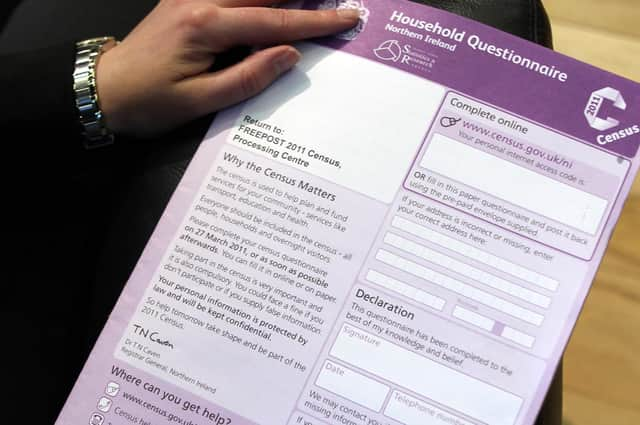Owen Polley: Census shows that most people do not want Northern Ireland to be abolished


We also expected a crude and triumphalist reaction from nationalist campaigners, who have insisted for years that demographics would eventually force us out of the UK.
As it happened, the published figures confirmed significant changes in the make-up of the province’s population, but they also showed that religion, identity and political preference overlap and interact in complicated ways.
That didn’t prevent the predicted Pavlovian responses.
Advertisement
Hide AdAdvertisement
Hide AdOn the strength of the census results, the Sinn Fein MP, John Finucane, demanded that the Dublin government prepare for a constitutional referendum. Meanwhile, SDLP leader, Colum Eastwood, declared that “those who lived through decades of discrimination … are able to breathe a sigh of relief.”
This statement seemed to imply that Catholics needed to outnumber Protestants for their own wellbeing or security. It was, at best, crassly expressed, and, at worst, another inflammatory intervention from a party that so often advises unionists to moderate their rhetoric.
In truth, the census figures tell us many things about Northern Ireland, but they do not reflect an impending victory for nationalism, the end of the Union or even any overwhelming demand for a referendum on our constitutional position.
The Roman Catholic Church was always by far the biggest Christian denomination here, whereas Protestants belonged to a range of different churches.
Advertisement
Hide AdAdvertisement
Hide AdThe most rapidly growing section of people now, by far, are those who refuse to identify with any particular religion. They form almost 17% of the population and include over a third of a million people.
Indeed, the census asked a number of questions about nationality and citizenship that were much more directly relevant to the constitutional issue than religion. When people were asked to describe their ‘national identity’, the largest group said they were ‘British only’ (32%). This cohort was only narrowly ahead of those who said they were ‘Irish only’ (29%), but significantly, 20% of the population said it was ‘Northern Irish only’.
We could get into a discussion about whether it’s sensible, credible or even possible to hold some of these identities exclusively, but that’s for another column. The important point is that people who feel only British or Northern Irish are unlikely to want Northern Ireland abolished and annexed by the Republic. And you can confidently say the same thing about the 8% that says it is ‘British and Northern Irish only’.
The census, though, does show an undeniable decline in feelings of Britishness in NI. In 2011, 40% of respondents described themselves as ‘British only’. It seems likely that some of this drop can be explained by Brexit, which had a polarising effect and complicated allegiances across the whole UK.
Advertisement
Hide AdAdvertisement
Hide AdWe saw, from the period of mourning for the Queen, that it is possible for people to move beyond these divisions and rediscover the cultural and historical affinities that bind them together. This is a dynamic that the government will have to pay close attention to, but the emotions that were inflamed by Brexit should diminish over time.
We already knew that the referendum result had encouraged an increased uptake of Republic of Ireland passports in Northern Ireland, as people sought the perceived convenience and reassurance of retaining an EU document. Though the census confirmed this trend, the overall number of British passport holders here dropped by only 70,000. The number of people who have only a British document still exceeds the number of people who own only an Irish document by nearly 400,000.
None of these statistics provide a basis for unionists to become complacent, but neither do they sustain the nationalist argument that Northern Ireland’s end is inevitable. They show that, alongside the growth of ‘others’ in the political arena, there is a large cohort that no longer aligns with any particular religion.
The factors that once indicated people’s likely identity or allegiance are becoming less reliable.
Advertisement
Hide AdAdvertisement
Hide AdFor unionists, that means they have to sell the merits of playing a full role in the United Kingdom to the broadest possible audience. In setting out their arguments, they will have to contend, not only with the idea that Northern Ireland should be absorbed by the Republic, but also with the notion that it can become ever more a constitutional ‘place apart’ from the rest of the UK.
Meanwhile, while republicans will try and twist the data, it reveals that they face problems too.
For all the propaganda about a ‘new’ or ‘shared’ Ireland where everyone will feel included, only 3% felt comfortable claiming an Irish identity alongside Northern Irishness or Britishness. That suggests that people are fully aware that the republican project to destroy Northern Ireland is as monolithic and exclusive as ever.